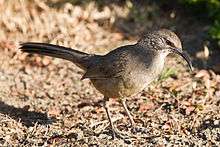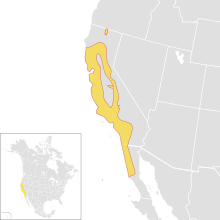California thrasher
| California thrasher | |
|---|---|
 | |
| In California | |
| | |
| Song | |
| Scientific classification | |
| Kingdom: | Animalia |
| Phylum: | Chordata |
| Class: | Aves |
| Order: | Passeriformes |
| Family: | Mimidae |
| Genus: | Toxostoma |
| Species: | T. redivivum |
| Binomial name | |
| Toxostoma redivivum (Gambel, 1845) | |
 | |
| California thrasher range | |
 |
Song
California thrasher singing in California |
| Problems playing this file? See media help. | |
The California thrasher (Toxostoma redivivum) is a large thrasher found primarily in chaparral habitat in California and Baja California. Similar to the crissal and Le Conte's thrashers in habit, the California thrasher is the only species of Toxostoma throughout most of its limited range. Like most thrashers, it rarely flies in the open, preferring to keep hidden in dense brush. Therefore, while it is common throughout much of its range, it is rarely seen.
At about 12 in (30 cm) and nearly 85 g (3.0 oz), the California thrasher is the largest species of mimid. It is generally brown, with buffy underparts and undertail (unlike the crissal). It has a dark cheek pattern and eye-line, and unlike most thrashers, has dark eyes. The California thrasher eats insects and small invertebrates.
References
- ↑ BirdLife International (2012). "Toxostoma redivivum". IUCN Red List of Threatened Species. Version 2013.2. International Union for Conservation of Nature. Retrieved 26 November 2013.
- "Toxostoma redivivum". Integrated Taxonomic Information System. Retrieved 24 January 2006.
Further reading
Books
- Cody, M. L. 1998. California Thrasher (Toxostoma redivivum). In The Birds of North America, No. 323 (A. Poole and F. Gill, eds.). The Birds of North America, Inc., Philadelphia, PA.
Articles
- Academy Of Natural Sciences Of P. (1998). California Thrasher: Toxostoma redivivum. Birds of North America. vol 0, no 323. pp. 1–22.
- Burns KJ & Barhoum DN. (2006). Population-level history of the wrentit (Chamaea fasciata): Implications for comparative phylogeography in the California Floristic Province. Molecular Phylogenetics & Evolution. vol 38, no 1. pp. 117–129.
- Farnsworth A. (2001). WatchList species as viewed through the Christmas Bird Count database. American Birds. vol 102, pp. 29–31.
- Pearson OP. (1979). Spacing and Orientation among Feeding Golden-Crowned Sparrows Zonotrichia-Atricapilla. Condor. vol 81, no 3. pp. 278–285.
- Rich T & Rothstein SI. (1985). Sage Thrashers Oreoscoptes-Montanus Reject Cowbird Molothrus-Ater Eggs. Condor. vol 87, no 4. pp. 561–562.
- Sgariglia EA & Burns KJ. (2003). Phylogeography of the California Thrasher (Toxostoma redivivum) based on nested-clade analysis of mitochondrial-DNA variation. Auk. vol 120, no 2. pp. 346–361.
- Winter L. (1369). Trap-neuter-release programs: the reality and the impacts. Journal of the American Veterinary Medical Association. vol 225, no 9. pp. 1369–1376.
- Zink RM, Dittmann DL, Klicka J & Blackwell-Rago RC. (1999). Evolutionary patterns of morphometrics, allozymes, and mitochondrial DNA in thrashers (genus Toxostoma). Auk. vol 116, no 4. pp. 1021–1038.
External links
| Wikimedia Commons has media related to California thrasher. |
| Wikispecies has information related to: Toxostoma redivivum |
- "California thrasher media". Internet Bird Collection.
- "Toxostoma redivivum". Avibase.

- California Thrasher - Toxostoma redivivum - USGS Patuxent Bird Identification InfoCenter
- California thrasher photo gallery at VIREO (Drexel University)
- California Thrasher Photo - "Birds of San Diego coastal scrub"
- Interactive range map of Toxostoma redivivum at IUCN Red List maps
